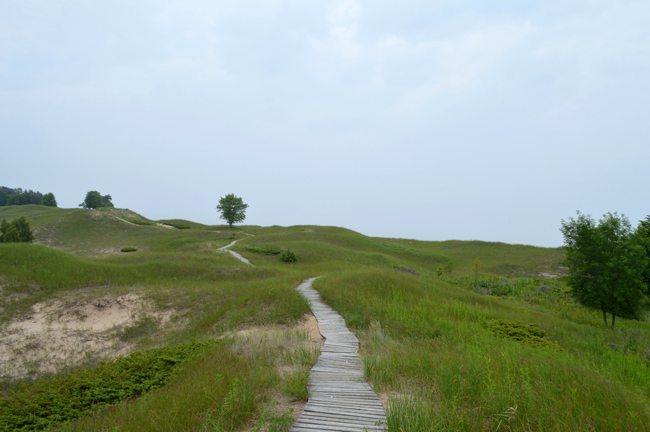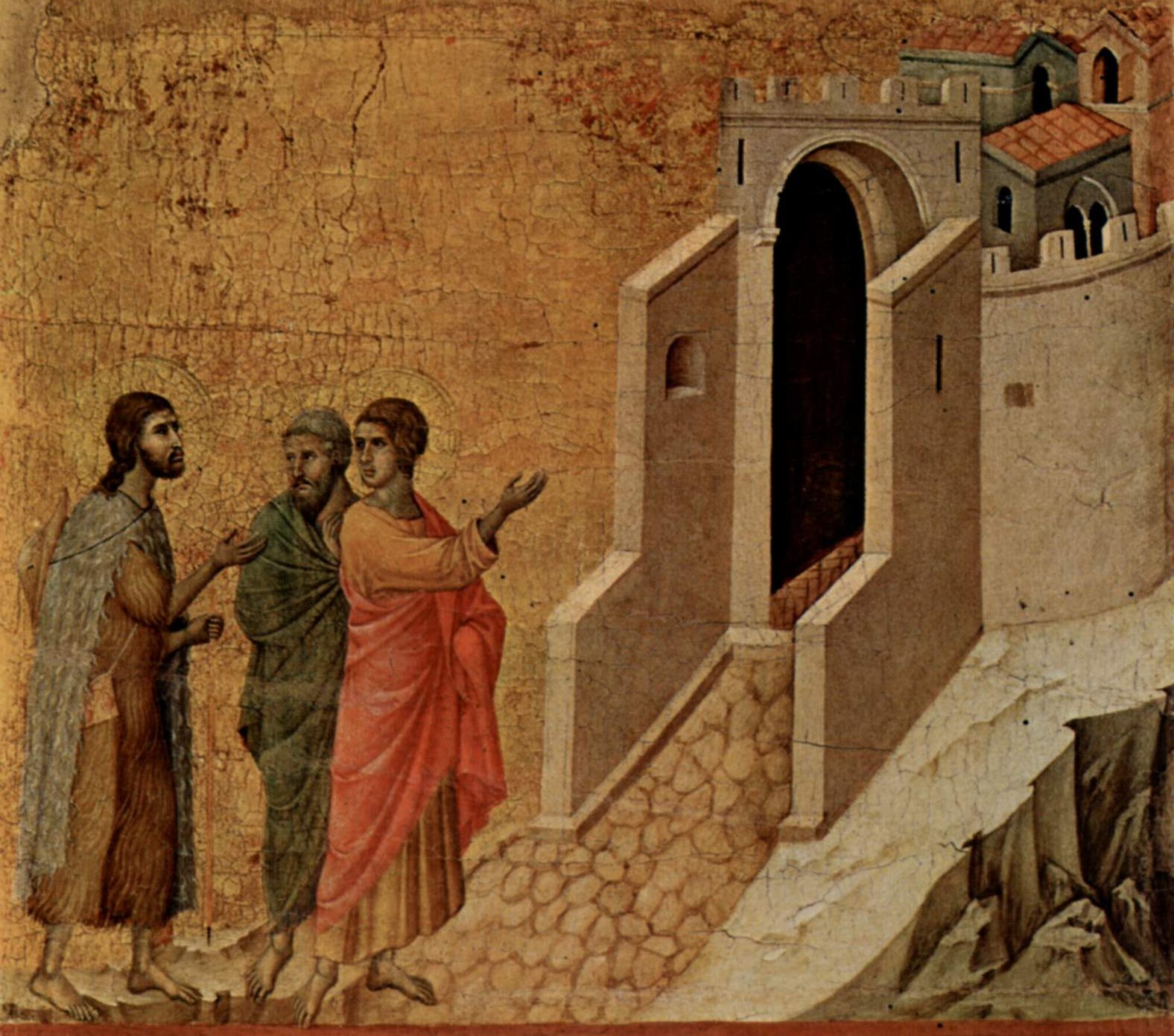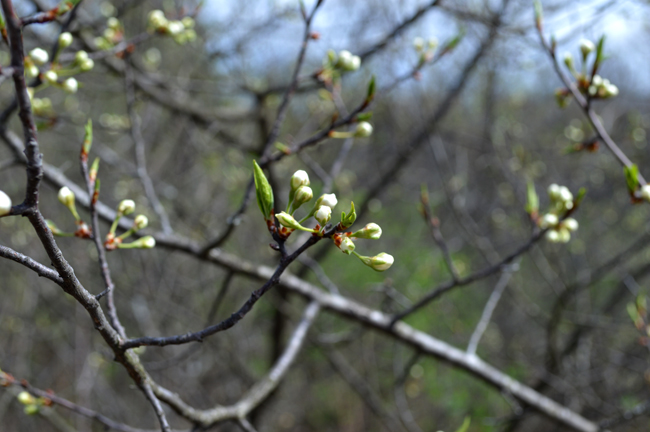
This week I was invited to preach! I was super honored and touched that our pastor invited me to be part of the regular cycle of lay people with whom he shares his pulpit. On Sunday, people were so encouraging and kind after the service. We have a pretty tight-knit little community, so it was a very safe space to share my story interwoven with the dramatic and wonderful story from the final chapter in the Gospel of Luke (Luke 24:13-35) of Jesus appearing to two disciples on their walk to Emmaus. (Here’s the full text of that great encounter which was read right before I got up to preach. It is the Gospel text for the third Sunday of Easter in Year A of the RVC.)
They recorded it along with the reading (but that was read from the midst of the people so you can’t really hear it), so I really start about minute 7.

“But we had hoped that he was the one to redeem Israel.” (Luke 24: 21a)
Today we proclaim the good news that Jesus restores our hope in his Resurrection through his presence in Scripture and Sacrament.

But we had hoped that…
When I was little, my parents read a lot of books to me. I was a late talker and a late reader, but neither of those hindered my ability to listen to my parents read to me — Narnia, Little House in the Big Woods, Wrinkle in Time, The Hobbit — I swam in story. I loved to make them up too. I just would walk around the big maple tree in our yard telling myself stories, or ride my bike around the block telling myself stories about unicorns, jungle adventures, cloud kingdoms, sea voyages, princesses and dragons. By middle school, I was a pretty voracious reader; it’s how I wanted to spend my free time — Saturday afternoons, weekend nights, or family vacations—plowing through stacks of Anne of Green Gables or some now somewhat embarrassingly large amount of contemporary Christian Romance.

By high school, I figured out that it would be a dream to just keep reading and making up stories and write them down for other people to read. I began to whisper my vulnerable little hope to others, my parents, my friends: “I hope to be a writer”, I told them. I also started to pay attention to what my English teachers thought of my writing, which upon reflection was probably a great deal too much power to give Mrs. Lien and Mr. Robinson. Because what I saw over and over and over were comments like, “Amy has such good ideas, but her writing isn’t strong.” “You’re just not a good writer.” Or B- because of the writing, the spelling, the grammar, the syntax.
The phrase “I hope to be a writer”, slowly turned into “I had hoped to be a writer”. Smart and educated people are weird about grammar and spelling errors. In no other area of my life have I ever been directly or indirectly told that I am lazy, or careless, or stupid, except regarding my writing. It broke my heart a bit. I decided then and there that if I was a bad writer then I couldn’t become a “Writer.” I shed a few tears, packed up my love of writing stories, and started down the road to doing something else that I had been told that I was much better at.

Our two travelers on the road to Emmaus were considerably more devastated than I was at 15 as they journeyed home away from Jerusalem—the setting for everything upon which they placed their hope. Luke writes that they were a picture of gloom and sadness. I am going to suggest several ways that we can join with them as they journey to Emmaus, and I think that the way that Luke has written this passage lends itself to having us imagine ourselves into the scene, as the unnamed companion. There are so many passages that work well for an Ignatian-style meditation where we put ourselves into the story, imagining the textures and smells, emotions and experiences of the participants. And this one is excellent for it.

Image: Gang nach Emmaus by Robert Zünd 1877
We join Cleopas and his companion in the middle of an argument. Scholar and theologian NT Wright suggests that perhaps the unnamed companion in the story is Cleopas’ wife, because the other reference we have to Cleopas is in John 19:25 “Near the cross of Jesus stood his mother, his mother’s sister, Mary the wife of Cleopas, and Mary Magdalene…” So for now we’ll refer to the unnamed companion as Mary. (Luke for Everyone p. 293)
So Mary and Cleopas are walking away from the capital city of Jerusalem to the smaller village of Emmaus about seven miles to the west of Jerusalem. And someone approaches and begins to walk with them and asks what they are talking about, which I would like to point out is one of the more amazing parts of this story.
If Evan and I were walking and talking and arguing about the most devastating event in our lives, and some stranger came up to us and asked us what we were talking about, I’m not sure that I’d want to invite him into our conversation. But in the middle of an argument, I don’t always want Jesus to show up and convict me of where I’m in the wrong, so perhaps it’s not all that strange.
After Jesus listens to Cleopas and Mary explain how they had hoped that Jesus was the prophet who was going to save Israel, but now he’s died and that morning some women said that he’s missing but alive, Jesus is a little stern with them as well— O foolish ones, and slow of heart to believe all that the prophets have spoken! (Luke 24:25) Jesus’ rebuking his followers always makes me a little uncomfortable that Jesus isn’t always nice and polite. But the hope of the Resurrection is not a mushy, vague, everything is going to be okay, and anyway you want to believe it is fine sort of thing. The hope of the Resurrection is specific and powerful and requires us to take it on Jesus’ own stern yet incredibly welcoming terms.

Image: Christus erscheint zwei pilgernden Apostel in Emmaus by Duccio di Buoninsegna c. 1310
Jesus invites Mary and Cleopas to walk through the Scriptures with him to see all the ways that God’s been writing the story from the beginning to be about Jesus. This is essentially what we just did two weeks ago at the vigil. We started at the beginning with Eve taking the fruit and giving a piece of it to Adam. Their eyes are opened, sin enters the world, and death begins to reign. Then we journeyed through Israel being rescued in the Passover, in the Red Sea, and then ended with the Prophets promising that again Israel would be redeemed and rescued.
Mary and Cleopas respond to this story as they draw near their home by urging Jesus to stay, inviting him into their home. And Jesus agrees. “When he was at table with them, he took the bread and blessed and broke it and gave it to them. And their eyes were opened, and they recognized him.” (Luke 24: 30) This of course is such a strong picture of the last supper from only a few nights before, and of the feast that we were invited to in response to our Easter vigil readings and every Sunday in the Eucharist.

Image: Supper at Emmaus by Caravaggio 1606
But, NT Wright also suggests that in keeping Mary in mind as the wife of Cleopas we can return to Eden where instead of Eve taking the fruit and breaking it to give to Adam, causing their eyes to open to their nakedness, we have Jesus breaking the bread, breaking himself, to give to another married couple (Luke for Everyone p. 296) . And then Luke says their eyes were opened and they recognized, not their vulnerable nakedness, but Jesus. My family is Eastern Orthodox. They would call this typology. Me, the girl with stories constantly running through my mind, I just call it a good story. And every good story draws you to the truth.

Image: The Supper at Emmaus by Rembrandt Harmenszoon van Rijn 1648
Then, Jesus vanishes. They exclaim about how their hearts were warmed by his story, and they respond by hopping back onto the road and walking another seven miles back to tell the eleven the good news that Jesus has been risen and appeared to Simon and to them on the road.
Cleopas and Mary receive the hope of Christ’s resurrection through the presence of Jesus himself as he walks with them, through Scripture and the story of God’s people, through Sacraments and the breaking of bread, and then in their proclamation of the Good News, to each other, to eleven, and then in a few weeks to Jerusalem and the ends of the earth. If we want the hope of the Resurrection of Jesus to permeate our lives we need to be walking with Jesus, looking for him in the Scripture, receiving him in the breaking of bread as we gather together, and then proclaiming that Good News to those around us.

It’s interesting that at the same time everything changes on the road to Emmaus, nothing external changes. The way that Cleopas and Mary understand now that Christ didn’t deliver Israel from suffering but instead took on their suffering himself, changes everything, but in fact, it was already Easter, Jesus had already died just like they had seen him do, and the women had already come that morning and told them that He had risen. Their encounter with Jesus changed their hearts, opened their minds, brought them into his presence and allowed them to understand, but he didn’t suddenly conquer Rome with a vanquishing army or say that he didn’t die at all like they had been thinking was the way out.

If we return to my story of how I had hoped to become a writer, the story is not a story of how I figured out how to spell and write a coherent sentence. Or how I learned to stop being a bad writer, and then I became a good writer. I think that’s what I would have told you the only way out of the mess was, the same way that Cleopas and Mary had hoped that Jesus would have conquered the Romans and led Israel out of its current Exodus. But that’s not the story.

In my story, I plunged into my new pursuit of wanting to teach history, specifically European history, which meant teaching college which meant getting a PhD. Of course, it turned out that running away from writing into a history PhD which consists of mainly writing, and writing things that are considerably less interesting to read, is now a little funny. But I got all the way into the history PhD and the very first thing that I did was to promptly fail a French exam. I had begun to suspect for a couple of years that perhaps I had dyslexia; it explained all those strange comments about strong ideas and weak writing. So, to get extra time on that dreaded French exam, I went and got tested for dyslexia, which, it turned out, I do have, along with a disorder of written expression.

Believe it or not, to me, this was exceedingly good news and filled with so much hope. That was the piece of the story that I was missing. It explained so many things to me about this love / hate relationship I had with wrestling words onto page. I always felt that the words wouldn’t stay the way I tried to put them: somehow they flipped and flopped around on that journey from my brain to my fingers.
It took a couple of years during which I somehow wound up with a Master’s Degree in history, but eventually I decided that I did really want to write children’s stories, that I could be a bad writer and a Writer. I could have dyslexia and still write. It’s not easy. I rely a lot on community, specifically Evan, to help me sort out the words.

But it is a concrete way in which I think about how everything changes in that moment when you understand, and yet the external situation may stay the same. God called me to write and gave me dyslexia because he’s a God who uses broken vessels to do beautiful things. He’s in the business of offering the hope of Resurrection in our lives, in the small and big places that need to be healed and redeemed. He does it through his presence, through the story of God’s people, and through the sacraments that draw us together into community.
I wouldn’t say that I like having dyslexia. I don’t. It’s annoying, and I would give it away if that were the kind of thing one could do. And I hope that it’s something that our children don’t inherit. But it’s part of my story, and most importantly, it’s not the end of my story.

And I think that motherhood is a new set of challenges in believing that I can be the writer that God called me to be. Sometimes I’m so busy and so tired, and I think of how many years it will be until I’m not those things, and it seems like God gave me a dream only to keep it out of reach again. But God uses our stories, the challenges that are sometimes overcome, and left behind, and sometimes are transformed into a beautiful part of the story, or they are part of our beautiful story which may be quite a different thing. I need to continue to bring the hopeless parts, the heavy parts, that are pictures of gloom and despair, to God. I need to listen to his voice, I need to read scripture, to gather together for the sacraments, so that my heart can be warmed and I can see how Jesus is with me.

And what about you? What burdens are you carrying this morning? Where are you feeling heavy and hopeless? Where are you having trouble believing that Jesus conquered death and sin like Cleopas and Mary had trouble that first Easter morning?
Do you have something right now where you are disappointed with what you thought God called you to do, but you can’t seem to see a way forward into that calling? Take a few seconds and see if you can find one of those heavy burdens.
I want to close by inviting you to picture yourself on the Road to Emmaus.

Imagine that it’s the afternoon of Easter. It’s spring time. Imagine a place with trees and several miles of a dirt path. Imagine the smell of new green things and flowers. It’s sunny, but you don’t feel cheerful, you feel devastated and let down. Who are you walking with? Who’s your companion? Your spouse? A close friend? A family member? Do you see yourself as the unnamed companion of Cleopas? Imagine that you are trying to explain your burden to that person, but you can’t seem to do it justice and it dissolves into an argument.

It’s hard to listen to the other person. It’s hard to understand how it had seemed like it would work out, and now it doesn’t. Now imagine that a man approaches you and your walking partner. You don’t recognize him, but you want to trust him.
Imagine that he wants to listen to you. He wants to hear what’s troubling you. Now imagine that you find that the story comes tumbling out of how you had this dream, this hope, this desire and it seemed like it was good and going to happen and now maybe it’s not. Imagine that he listens. Now imagine that he tells you that you’ve been thinking about it the wrong way. Imagine that he tells you that this current difficulty doesn’t have the final say about it.

Instead, He begins to tell your story. Maybe he starts by telling you the Big story, of creation and the fall, of ways that God has over and over and over again rescued his people, given them purpose and life and blessing. Or maybe He tells you the small story, the story of your own creation and fall, and of the ways that God has over and over and over rescued you, given you a purpose and life and a blessing. Imagine that your heart grows warm with his words; you believe that He’s right, that God has proved himself faithful, and He’s been redeeming the world since the beginning.
Now, imagine that you’ve come to the end of your walk, and you are back on your own block, in front of your own house. Imagine that you want to invite Jesus into your house. Imagine that you invite him to your table—to where your family sits, to where your friends come, to where your missional community has a meal.

What’s on your table? What do you serve this stranger for dinner? Imagine that he takes your bread and wine, your meatloaf and salad, your mac and cheese and glass of milk, your breakfast for dinner the stuff of your life and your church community. He blesses it and breaks it, passing around what you need for the day for your body and your spirit.
Imagine that your eyes are opened to see Jesus in your midst: in the midst of your hopes rekindled and your faith nourished.
And imagine this vision of Jesus, his presence in Scripture and Sacrament, gives you a testimony to share with your family, with your church, and your community of how God met you in the darkness and brought you into his light so that you might be able to proclaim the goodness of the death and resurrection of Jesus Christ to the ends of the earth.
– In the Name of the Father, and the Son, and the Holy Spirit. Amen

So beautiful and powerful, Amy! I’ve been caught up in this story for the past couple of weeks, and absolutely love you meditation on it here. Thank you for sharing with your church and with us! Much love.
Thanks Brittany! Wish that we could see you guys face to face this Eastertide!!
Your meditation on this story of despair to hope works on so many levels!
Thanks for sharing it with all of us, near and far! Love to all, Kate
Thanks Kate! That means so much to me! We miss you!